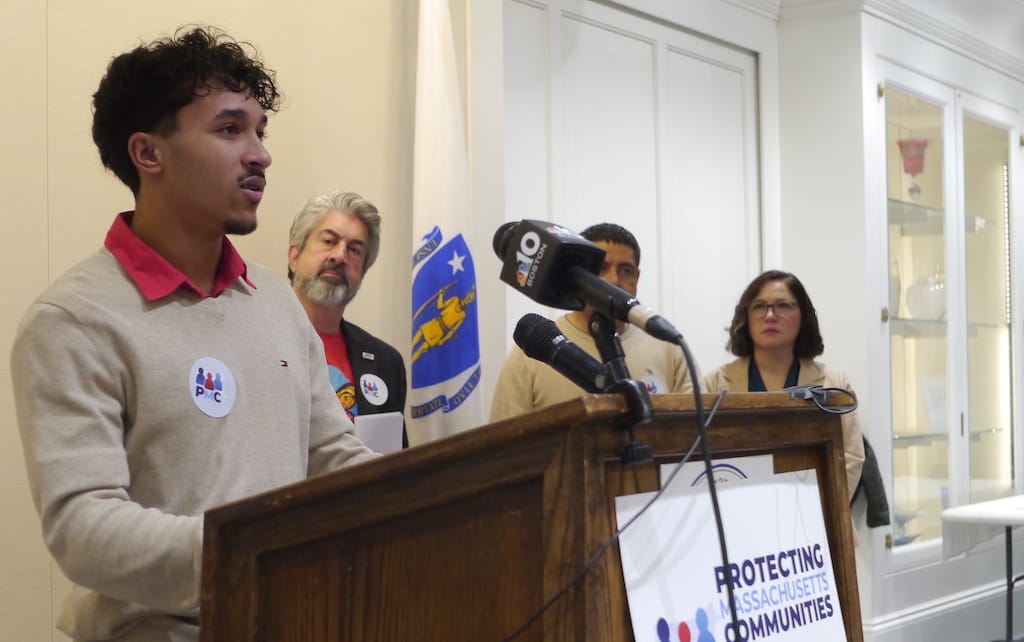Coalition presses legislature for immigrant protections
Coalition members pressed law makers to back legislation that would bar local law enforcement from conducting civil immigration enforcement and bar state jails and prison from entering into agreements with ICE to hold detainees.
Federal officials have identified Massachusetts as a sanctuary state and targeted the Bay State for stepped up immigration raids, targeting immigrants often without regard for their legal status. High profile cases included nine workers at an Allston carwash — six of whom were later determined to be legal residents and released — Tufts University graduate student Ruymesa Ozturk and Milford High School junior Marcelo Gomes da Silva who was detained for several weeks in May after agents arrested him while he was en route to volleyball practice.
Tuesday, da Silva joined a coalition of immigration activists calling on lawmakers to pass bills that would protect immigrants against federal Immigration and Customs Enforcement (ICE) officers who are targeting them, seemingly without regard for their legal status.
“Something important that Massachusetts should be doing is helping fund lawyers for immigrants because one thing that is true is that immigrants alone will not be able to fight against the government,” he da Silva said, noting that those who enter immigration court without an attorney are five times more likely to be deported than those who do.
Speaking to coalition members, Massachusetts Teachers Association (MTA) President Max Page said the threat of deportations is depressing attendance at many Massachusetts schools.
“Because of the deportations, because of the kidnapping of our children, because of the fear, thousands of young people, have been forced for their own physical safety and freedom to stay away from school,” he said.
In addition to the Legal Defense Act, which would provide legal counsel to immigrants, coalition members pressed law makers to back legislation that would bar local law enforcement from conducting civil immigration enforcement and bar state jails and prison from entering into agreements with ICE to hold detainees.
“We stand here today because it is our shared responsibility, not only for the sake of immigrant families, humanity, but for the safety and survival of every one of us to ensure that the laws of Massachusetts protect all of us,” said Gil Calderin, director of advocacy for the Massachusetts Immigrant and Refugee Advocacy (MIRA) Coalition.
Packed in a State House hearing room were representatives of groups including the ACLU of Massachusetts, several Service Employees Industrial Union locals, the MTA, the Jewish Alliance for Law and Social Action and the Brazilian Workers Center.
Massachusetts cities and towns have largely refused to work with ICE to deport people whose only crimes are civil immigration infractions. Statewide, 69% of Massachusetts residents disapprove of how ICE is handling arrests and deportations, according to polling released Tuesday by Suffolk University and the Boston Globe.
Yet 287(g) agreements — a program through which local law enforcement partners with ICE to arrest and detain immigrants — are not illegal in Massachusetts. The Plymouth County House of Correction has more than 500 beds set aside for federal detainees. Activists maintain that the number of deportations in any area of the United States is directly proportional to the number of detention beds available in that area.
“Terror is the goal of ICE,” said Cari Medina, executive vice president of 1199 SEUI. “Yet Massachusetts doesn’t have to contribute to this terror. As we’ve seen law enforcement agencies across the state refuse to coordinate with ice, we need to make that a reality for every city and town. Safety should not depend on your ZIP Code.”
Medina noted that legislatures in seven states — California, Connecticut, Illinois, Oregon, Washington State, Maryland, Delaware — have banned participation in 287(g) agreements.
“Massachusetts needs to be next,” she said.
State senators Jamie Eldridge and Liz Miranda filed The Safe Communities Act, which would bar such agreements. The bill, which Eldridge has sought to advance in the State House for more than 10 years, is sponsored in the House by representatives Priscilla Sousa and Manny Cruz. Eldridge told GBH News Tuesday that the bill has more momentum this year as ICE has ramped up its deportation regime under the Trump administration.
“There are even worse tactics by ICE agents than existed during Trump’s first term,” he said. “So I do think there’s a lot of momentum.”




